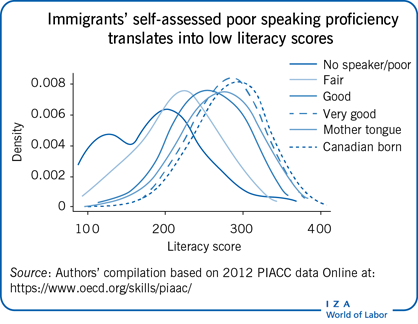Elevator pitch
Over recent decades, Western countries have admitted many immigrants from non-traditional regions (e.g. Philippines, India, China), which has coincided with poor economic integration. Language proficiency is an important determinant of economic integration; in addition to being a component of human capital, it plays a key role in facilitating the transmission of other components of human capital. Examining the strengths and weaknesses of objective and subjective measures of language proficiency is crucial for good integration policy, as is understanding the relationship between these measures and earnings, a key indicator of economic integration.

Key findings
Pros
Language proficiency is a component of human capital and facilitates the transmission of other components.
Differences in objective language proficiency explain most of the immigrant/native-born earnings gaps.
Self-assessed measures of language proficiency are more readily available and contain a large amount of information related to earnings.
Skills can be used to compare human capital across individuals, avoiding issues related to education quality and work experience.
Cons
Objective measures of language proficiency are uncommon; more common subjective measures contain measurement error and/or capture different skills.
Test scores reflect a mix of cognitive ability and language proficiency since many immigrants do not take tests in their mother tongue.
Available measures of literacy and numeracy are highly correlated, implying they may not capture the skills they are intended to test.
Objective tests are often not challenging enough for high-skilled respondents.
Literacy and numeracy do not capture the full range of skills needed to succeed in the labor market.